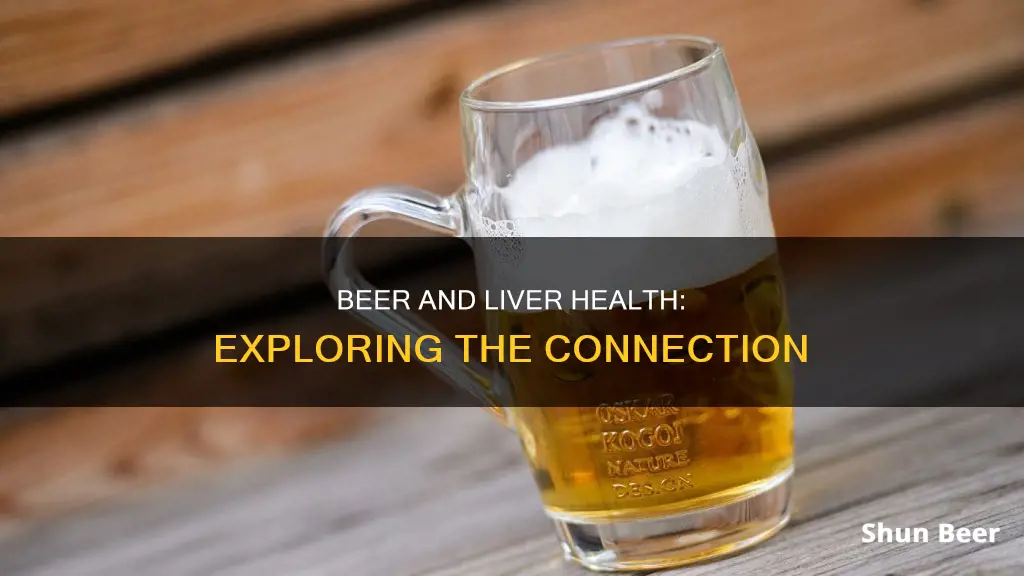
Beer is a popular alcoholic drink that has been enjoyed by people for years. However, when it comes to its impact on the liver, there are mixed opinions. On the one hand, excessive consumption of beer can lead to serious liver-related issues such as fatty liver disease, cirrhosis, and liver cancer. On the other hand, light to moderate beer consumption may offer some health benefits, including a reduced risk of heart disease and a potential decrease in the risk of neurodegenerative diseases. So, is beer healthy for the liver? The answer may lie in understanding the risks associated with heavy drinking and the potential benefits of moderate consumption.
| Characteristics | Values |
|---|---|
| Positive impact on health | Beer may have certain health benefits, such as decreasing the risk of heart disease and osteoporosis. |
| Negative impact on health | Excessive consumption can lead to conditions such as cancer, liver disease, and cardiovascular disease. |
| Nutritional value | Beer contains various nutrients, including vitamins B1, B2, B3, B5, and B12, and several amino acids. |
| Impact on the liver | Beer can negatively impact the liver when consumed in excess. The liver is responsible for breaking down and filtering out alcohol and other toxins from the blood. Heavy drinkers are at high risk of developing alcoholic fatty liver disease. |
| Reversibility of liver damage | Someone who has alcoholic liver disease can reverse the condition by removing alcohol from their diet for several weeks. |
What You'll Learn

Beer can help to decrease the risk of heart disease and osteoporosis
Beer has long been a favourite beverage for winding down after a long day or socialising with friends. But is it good for your health?
Beer and Heart Health
Some studies have shown an association between moderate alcohol intake and a lower risk of dying from heart disease. However, it's hard to determine cause and effect. For example, wine drinkers may have higher incomes, which are associated with more education and healthier diets.
There is some evidence that moderate alcohol consumption may help to slightly raise levels of "good" HDL cholesterol. Additionally, red wine, in particular, may offer protection to the heart due to its antioxidant content. However, these benefits can also be gained through exercise and eating fruits and vegetables.
Heavy drinking, on the other hand, is linked to poor health outcomes, including heart conditions, high blood pressure, heart failure, stroke, and cardiomyopathy. Excessive alcohol intake can also contribute to obesity and its associated health risks.
Beer and Osteoporosis
Osteoporosis is a chronic bone disease characterised by low bone mineral density and an increased risk of fractures. Beer may have a protective effect against osteoporosis due to its content of silicon, polyphenols, iso-α-acids, and ethanol.
A study by researchers at the University of California, Davis, found that beer is a rich source of dietary silicon, which can help prevent osteoporosis. The study examined 100 commercial beers and found that those containing malted barley and hops had higher silicon content than beers made from wheat. Hops, an ingredient in bitter beers, may also protect the liver by preventing the buildup of liver fat.
However, it's important to note that while low quantities of alcohol may have bone density benefits, higher intakes have been shown to decrease bone strength. Additionally, other health concerns related to alcohol consumption cannot be ignored.
While beer may offer some potential health benefits, it's important to consume it in moderation. Sticking to moderate levels of drinking and not overdoing it is key to maintaining good health.
Beer After a Workout: Healthy or Not?
You may want to see also

Excessive beer consumption can lead to liver disease
Alcoholic liver disease is a common but preventable condition. It is caused by heavy alcohol consumption, which leads to a build-up of fat inside the liver cells, resulting in an enlarged liver. This condition is known as steatotic (fatty) liver and is the most common alcohol-induced liver problem. While a healthy liver can contain small amounts of fat, a build-up of more than 5% of its weight can lead to fatty liver disease.
Excessive beer consumption can lead to alcoholic liver disease, including acute hepatitis and cirrhosis. Acute hepatitis is an inflammation of the liver, characterised by liver cell death and permanent scarring. Cirrhosis, on the other hand, is the destruction of normal liver tissue, leaving scar tissue in its place. This can lead to liver failure and the need for a liver transplant.
The liver is responsible for processing nutrients in our diet and converting them into substances our bodies can use. It also plays a crucial role in detoxifying the blood and producing bile to aid digestion. When we consume excessive amounts of beer or other alcoholic beverages, the liver metabolises the alcohol, breaking it down so that our bodies can use it. However, if we drink more alcohol than the liver can process, it can become damaged.
According to the NHS, consuming 2-3 alcoholic drinks per day over an extended period can harm the liver, and binge drinking of 4-5 drinks per day can cause serious liver damage. Binge drinking is defined as consuming four or more drinks for women or five or more drinks for men within a couple of hours, leading to blood alcohol concentrations beyond the legal driving limit. Extreme binge drinking, a more concerning trend, involves drinking at levels far beyond this binge threshold.
The effects of excessive beer consumption on the liver can be detrimental. In the short term, the liver and body become saturated with alcohol, which accumulates in the blood and bodily tissues. Over time, this can lead to chronic liver inflammation, scarring, and cirrhosis. Additionally, alcohol-associated liver disease can increase the risk of kidney problems, gastrointestinal bleeding, fluid build-up in the abdomen, confusion, liver cancer, and severe infections.
Spirits vs Beer: Which Alcoholic Beverage is Healthier?
You may want to see also

Beer contains nutrients and vitamins
Beer is made by brewing and fermenting cereal grains with yeast, hops, and other flavouring agents. The primary vitamins in beer are usually B-complex vitamins, including folic acid, niacin, riboflavin, and vitamin B-6. In addition, beer contains small amounts of potassium, calcium, thiamine, iron, and zinc. The content of B vitamins and minerals is a result of beer being made from cereal grains and yeast.
Beer is also an excellent source of antioxidants, which fight free radicals in the body and reduce the risk of chronic conditions and certain forms of cancer. The darker the beer, the more antioxidants it tends to have.
However, it is important to note that beer is not a good source of vitamins and minerals compared to whole foods like fruits and vegetables. While beer may provide some nutritional benefits, it is not a substitute for a healthy diet.
Additionally, excessive alcohol consumption can lead to fatty liver disease, which is caused by a build-up of fat in the liver. Fatty liver disease can progress to more serious conditions such as cirrhosis, liver disease, and liver cancer. Therefore, it is crucial to consume beer in moderation and be mindful of the potential health risks associated with excessive alcohol intake.
Beer, Tomato Juice: Healthy Combo or Not?
You may want to see also

Beer can increase the risk of cancer
Beer is a popular alcoholic drink, but is it healthy for the liver? The answer is complex. While some studies suggest that a compound in hops, an ingredient in bitter beers, may protect the liver by preventing the build-up of liver fat, excessive alcohol consumption can also lead to serious liver damage, including cirrhosis and liver cancer.
Beer and Liver Health: The Good and The Bad
A study published in the journal Alcohol and Alcoholism found that hops in beer may have a protective effect on the liver, possibly due to its antioxidant properties that minimise cell damage. This suggests that bitter beers like IPAs and ESBs, which are high in hops, may be better for the liver than other types of beer.
However, it is important to note that excessive alcohol consumption is a well-known risk factor for liver damage and disease. Alcoholic liver disease, including fatty liver disease and cirrhosis, can lead to liver failure and is a significant cause for concern. According to the NHS, even 2-3 alcoholic drinks per day over a long period can harm the liver, and binge drinking of 4-5 drinks per day can cause serious liver damage. Therefore, while the hops in beer may offer some potential liver benefits, excessive drinking can negate these effects and cause significant harm.
Alcohol consumption, including drinking beer, has been strongly linked to an increased risk of several types of cancer. Here are some reasons why beer can increase the risk of cancer:
- Acetaldehyde: When the body breaks down ethanol, a chemical substance found in alcoholic beverages, it produces acetaldehyde, a toxic chemical and probable human carcinogen. Acetaldehyde can damage DNA and prevent cells from repairing this damage, allowing cancerous cells to grow.
- Hormonal effects: Alcohol can alter hormone levels, such as estrogen, which can act as messengers that stimulate cell growth and division. Increased cell division provides more opportunities for mutations and the development of cancer.
- Reduced nutrient absorption: Alcohol interferes with the absorption and utilisation of vital nutrients that protect the body from cancer, including vitamins A, B, C, D, E, K, and folate, as well as minerals like iron and selenium.
- Weight gain: Alcohol contributes to excess calorie intake, which can lead to weight gain. Obesity is a risk factor for over 12 types of cancer.
- Interaction with tobacco: Drinking alcohol and smoking tobacco together significantly increases the risk of certain cancers, including oral and throat cancers. Alcohol may make cells more susceptible to the harmful effects of tobacco.
In conclusion, while the hops in beer may offer some potential liver benefits, excessive alcohol consumption, including drinking large amounts of beer, can increase the risk of liver damage and cancer. Therefore, moderation is key when it comes to alcohol consumption to minimise these health risks. For individuals concerned about their liver health or cancer risk, reducing alcohol intake or abstaining from alcohol is recommended.
Exploring the Fine Line: Beers and Health
You may want to see also

Non-alcoholic beer is a healthier option
How Alcoholic Beer Impacts the Liver
Before we delve into the effects of non-alcoholic beer on the liver, it's crucial to understand how a healthy liver functions and how alcoholic beer impacts it. The liver, one of the body's largest organs, performs a wide array of metabolic functions, including processing nutrients from our diet and converting them into substances our bodies can use. Additionally, it plays a vital role in processing and eliminating toxic substances from the body.
When we consume alcoholic beer, the liver metabolises the alcohol, breaking it down so the body can utilise it. However, a fully functioning liver can only process one standard drink per hour. Consuming more alcohol in a short period leads to alcohol accumulation in the blood and bodily tissues. Even 2-3 alcoholic drinks per day over an extended period can harm the liver, and binge drinking (4-5 drinks per day) can cause severe liver damage. Long-term alcohol overuse impairs the liver's ability to remove harmful substances, increasing the risk of chronic liver inflammation and cirrhosis.
Benefits of Non-Alcoholic Beer for the Liver
Non-alcoholic beer, with 0.0% alcohol and fewer calories, is a healthier choice than its alcoholic counterpart. A 2020 study observed that non-alcoholic beer had positive effects on patients with liver cirrhosis, a condition caused by long-term liver damage. The study found that non-alcoholic beer was safe and well-tolerated by these patients and even led to an improvement in their quality of life, particularly in social function and mental health.
Another study, which included patients with cirrhosis, found that a multifactorial intervention of diet, exercise, and non-alcoholic beer resulted in improvements in endothelial function, nutritional status, and quality of life. This suggests that non-alcoholic beer, in conjunction with a healthy lifestyle, may have beneficial effects for those with liver conditions.
Risks of Non-Alcoholic Beer
While non-alcoholic beer is generally a healthier option, it's important to note that it may still contain small amounts of alcohol. Some studies suggest that non-alcoholic beers can have higher alcohol levels than indicated on their labels, and people with liver impairments may experience higher blood alcohol levels after consuming them. Additionally, for those recovering from alcohol use disorder, the smell of non-alcoholic beer may serve as a trigger.
Non-alcoholic beer is generally a healthier option for the liver compared to alcoholic beer, as it doesn't saturate the liver with alcohol. However, it's important to be mindful of potential risks, especially for those with liver conditions or a history of alcohol use problems.
Beer Bread: Healthy or Harmful?
You may want to see also







